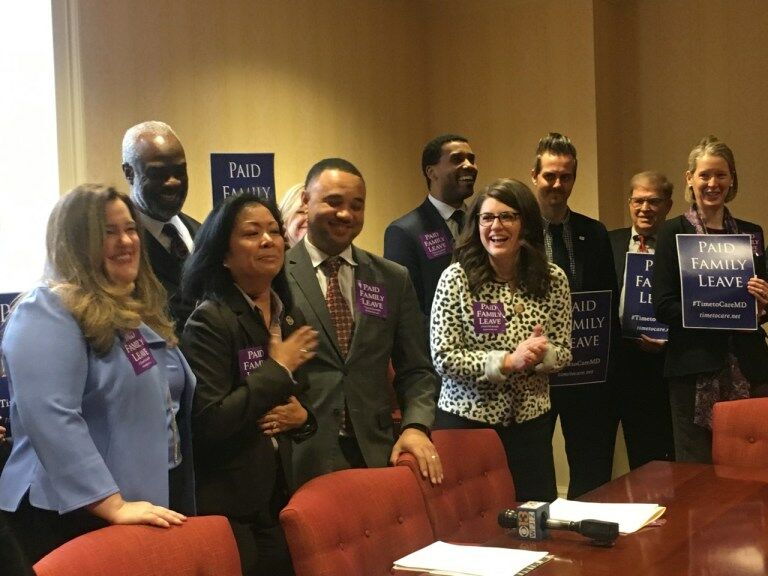This article was republished with permission from WTOP’s news partners at Maryland Matters. Sign up for Maryland Matters’ free email subscription today.

This content was republished with permission from WTOP’s news partners at Maryland Matters. Sign up for Maryland Matters’ free email subscription today.
Legislation that would provide partial pay to help workers who need to take time off to care for ailing relatives will be filed again in Maryland’s House of Delegates and Senate, lawmakers said Tuesday.
Sen. Antonio L. Hayes (D-Baltimore City) and Del. Kris Valderrama (D-Prince George’s) announced their intent to cross-file the Time to Care Act.
The measure would ensure Maryland workers up to 12 weeks of partial wage replacement, Hayes said.
It would be financed through a payroll tax shared equally by the worker and employer, and would be capped at half of 1 percent, said Del. Ariana B. Kelly (D-Montgomery), a co-sponsor, as is Sen. Sarah K. Elfreth (D-Anne Arundel).
Paid leave would be at least $50 per week and no more than $1,000 per week, according to a fact sheet distributed at the announcement.
Leave would be funded through a state-administered insurance pool.
Because there is no national program for paid family or medical leave, most workers who need to become caregivers find themselves in a tight spot when that need arises. Only 17% of the American workforce has access to such a benefit, Hayes said.
“This forces far too many of our citizens, especially those of us living paycheck to paycheck, to have to choose between economic security and caring for our families in times of need,” Hayes said.
Sponsors and supporters shared stories about difficulties their families faced when they took time to be caregivers to children and aging parents.
Hayes talked about being raised by his grandmother, who he said was “strong as the Rock of Gibraltar,” while his mother struggled with substance abuse issues.
He said that he and his family members returned the favor, taking care of his grandmother during her struggle with Alzheimer’s disease.
“This is a really important piece of legislation for many families throughout Maryland who have the awesome responsibility of being caregivers for loved ones who shepherd them along the way,” Hayes said.
Kelly said her perspective has expanded and shifted during the eight years she has been involved with paid family leave legislation.
“I was first elected when I had toddlers, and I started thinking about this from the perspective of maternity and paternity leave,” Kelly said, “and now, 10 years later, I’m thinking about this from the perspective of the child of a parent with dementia.”
Kelly said she’s seen the number of states that have adopted paid family leave legislation grow from three to nine, and noted it has also been adopted in Washington, D.C.
“It’s because these programs work and they help people and it’s the type of program that everyone can benefit from, and it solves … a problem we have with our economy,” Kelly said.
Political strategist Jayson Williams said he made paid family leave a benefit for his employees after watching his own mother struggle to make ends meet as she cared for his ailing grandmother.
Williams, President and CEO of MD Strategic Consulting, said the policy is crucial to retaining his employees and helps him compete with bigger companies for workers.
“It really is a unique competitive piece because I can’t compete with some corporations that are larger than me, so the way I take care of my employees is extremely, extremely important to me, to our company culture and to the growth,” he said.
“I can’t give out $10 billion bonuses, but I can take care of the people that have taken care of me and helped me grow.”
Dan Chudy, the art director at Williams’ company, said that having paid leave helped his family in immeasurable ways — so much so that he jokes that Williams’ business is his “forever company.”
Both of Chudy’s parents were diagnosed with Alzheimer’s disease, and he said he is grateful for being able to assist them without fear of losing his job.
“I remember walking into Jayson’s office one morning full of anxiety, you know, not knowing about my job, my future, how will I get paid to be able to take time off to go take care of them,” said Chudy. “He didn’t even bat an eye. He said, ‘Go take care of your family,’ ‘Do what you got to do … you shouldn’t have to worry about that.’”
“I would never dream of leaving a company that takes care of myself and my family as well as Jayson and everyone does.”







